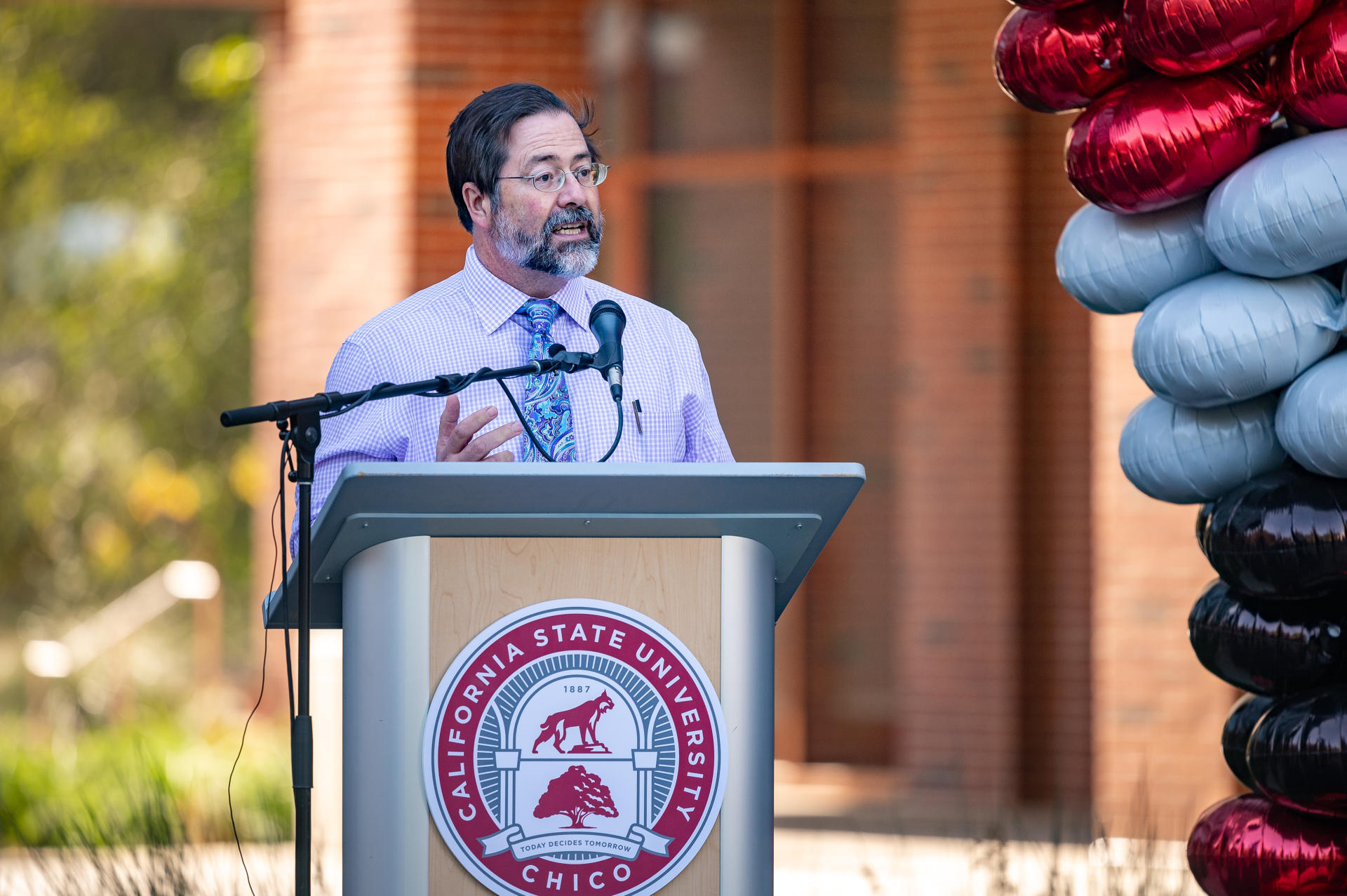College of Natural Sciences Dean Recognized with Environmental Lifetime Achievement Award

David Hassenzahl (Dean, NSC) (center) gives remarks as the public came out to celebrate the opening of the new science building, a state-of-the-art building is a beacon for science and science education on Friday, October 8, 2021 in Chico, Calif. (Jason Halley/University Photographer/Chico State)
After more than two decades teaching students, guiding scholars in the environmental sciences and helping change the way educators approach interdisciplinary scholarship, College of Natural Sciences Dean David Hassenzahl has received a prestigious honor recognizing his work.
The Association for Environmental Studies and Sciences (AESS) has recognized Hassenzahl with its William R. Freudenburg Lifetime Achievement Award, honoring the spirit of the organization’s co-founder, Freudenburg, who spawned a new generation of environmental professionals and academics who have pursued interdisciplinary research addressing some of the most pressing issues of our time.
“I am honored that the current leadership at AESS recognize and see value in what I have done to support our academic field and the many individuals who have committed their careers to it,” said Hassenzahl, who will be formally recognized at the AESS Annual Conference from June 20–22 in Towson, Maryland. “I think I have made some contribution to shifting interdisciplinarity from being seen as superficial to being a respected academic approach.”
For more than two decades, Hassenzahl has worked to demonstrate that the most important questions about the environment cannot be answered with any single discipline. Whether in his own research, his work in the classroom, or initiatives shaping educational offerings at his various institutions, he has championed collaboration across fields.
After receiving his bachelor’s degrees in paleontology and environmental science at University of California, Berkeley, Hassenzahl earned his PhD from Princeton University at its School of Public and International Affairs. Chico State Provost and Vice President for Academic for Academic Affairs Debra Larson said that in pursuing a PhD, one has a deep passion for a field of study, as well as the ability to advance that field—which is precisely what Hassenzahl would go on to represent during his career as an educator and researcher.
“To have a career recognized by your peers for your contributions is a significant testament to his accomplishments and dedication and passion for the work of environmental sciences,” she said. “We are grateful that David is part of our community at Chico State and continues to share his knowledge on a broader scale across the University and the CSU.”
In 2000, Hassenzahl was an assistant professor of environmental studies at the University of Nevada, Las Vegas and searching for a professional organization to support him and his novel approach to interdisciplinary research.
In 2006, he discovered a group of academics working to create an organization to support this approach and was excited by an opportunity to create a more established network. Hassenzahl helped to found AESS in 2008, and continued to support its efforts to lead the way in interdisciplinary environmental academic research, helping create the organization’s bylaws, serving as its first secretary for six years, organizing several of its conferences, fundraising and serving a term as president, among other roles. He also worked to advance equity, diversity, and inclusion initiatives, with a focus on growing opportunities for historically underserved populations within environmental studies and sciences.
As founding dean of the Falk School of Sustainability at Chatham University, starting in 2010, and today as dean for Chico State’s College of Natural Sciences, where he’s been since 2014, Hassenzahl’s influence as a leading-edge educator continued to spread and grow within academia.
“Two decades ago, there weren’t interdisciplinary scholars in positions like mine—now it is considered a good thing,” he said.
Hassenzahl’s contributions in the classroom also include two major environmental science textbooks, as well as a large, multi-institutional National Science Foundation grant that improved how climate change is taught in colleges and universities across the country. His areas of research have included the role of uncertainty in environmental, health and technological risk decision-making from the individual to global scales, as well as interdisciplinary environmental education surrounding climate change and energy.
In addition to being a faculty associate for Chico State’s Center for Water and the Environment, Hassenzahl has participated in environmental-related organizations including the Council of Environmental Deans and Directors and the Association for the Advancement of Sustainability in Higher Education.


